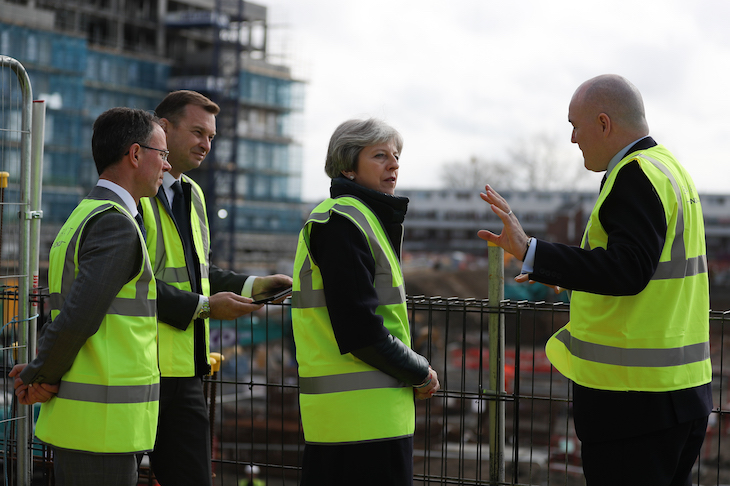Theresa May has belatedly taken the advice I offered her here last May and named a supremo to tackle the housing crisis — which has been getting steadily worse since her campaign promise to ‘fix the broken market’. But the supremo isn’t Sajid Javid, the Communities Secretary who is, the prime minister says, doing ‘incredible work’ in this area; so incredible, she might have added, that she and the Chancellor have had to bin Javid’s more radical ideas. And it isn’t Boris, who was my own cunningly crafted suggestion for the job. No, here’s what she said in her speech on Monday: ‘I’ve taken personal charge of meeting the housing challenge, leading a taskforce that brings together ministers and officials from every corner of Whitehall to attack the crisis on every front.’
Oh dear. We’re back in the Tony Blair mode of ‘eye-catching initiatives [with which] I should be personally associated’. But that can only play badly for Mrs May while her energies are overwhelmingly taken by Brexit. The housing story was barely even making headlines by Tuesday, apart from some mischief-making about a fake-brick lectern that made her look as if she was speaking out of a chimney.
But still it’s worth asking: what on earth can central government do to accelerate the number of new homes available at the low end of the price range? In political terms, this is the issue most likely to alienate voters in their late twenties and thirties, who in any previous decade since 1945 would by now be first-time homeowners and thereby natural Tories. They’re currently more likely to vote for the catastrophe of Corbyn, and that’s a big reason why the housing shortage matters to all of us. But are there any quick-fix solutions or has Mrs May set herself up for another failure?
Her approach was to take swipes both at developers for ‘land-banking’, or sitting too long on unbuilt sites for which planning has already been granted; and at local authorities for failing to release sufficient land and grant permissions quicker. Was she right in either respect? I asked a veteran housebuilder: ‘We build as fast as we can once we’ve got detailed permission. It’s a total myth that we sit on “consented” land for accounting gains. But there’s a limit to the number of houses we can build and sell in a year on any given site: it might be 100 to 150 — so a very large site will always take several years to complete. The real problem is the time it takes to get detailed permission: never less than two or three years, and on one site in [a provincial city], whose planners have a tremendously difficult reputation, 23 years. In other places — Newcastle, for example — planners are more switched on and we build much faster.’
So one practical answer is to find the most progressive local authority planning departments and make them the benchmark for the most obstructive and nimbyist. The problem is, of course, that the latter are highly likely to be dominated by councillors from Mrs May’s own party. But perhaps not after local elections in two months’ time.
Stupid populism
On the matter of President Trump’s imposition of a 25 per cent tariff on US imports of steel and 10 per cent on aluminium, I cannot improve on the comments of the sage of Washington, the former Bank of England monetary policy committee member Adam Posen, who called it ‘straight-up stupid’ and ‘fundamentally incompetent, corrupt or misguided’. Indeed virtually all economically literate opinion was united in condemning a move which will hurt America’s steel-producing allies in Europe and South Korea without seriously impeding China’s advance, and will surely provoke a salvo of protectionist responses — contributing to a slowdown of global cross-border trade and investment that has been a visible trend since the beginning of this decade.
It’s the kind of bone-headed blue-collar populism embraced by the former Chrysler boss Lee Iacocca in the 1980s when he was briefly touted as a presidential candidate and compared himself to the revolutionary patriot Paul Revere: ‘I’m the only guy on a goddamn horse saying “The Japanese are coming, the Japanese are coming”… And it’s all the fault of the dumb sonofabitch who allowed them into our market free of charge.’ Yes, globalisation leaves its trail of victims; but a tariff war will ultimately be worse for everyone, including the workforce of America’s already diminished steel industry, with whom Trump has no genuine empathy at all.
The picture it brings to my mind is of the once mighty Bethlehem steelworks in Pennsylvania that was defeated by global competition in 1995, and whose site is now occupied by an exemplar of the one business sector Trump can truly claim to understand: a giant casino, built to exploit a politically disappointed populace that has been left with no other hope of prosperity.
Going Dutch?
Unilever, the consumer goods conglomerate formed in 1929 by the merger of Margarine Unie of Rotterdam with Lever Brothers of Port Sunlight, is a model of cross-Channel collaboration that pre-dates the European Union we’re about to leave. So the decision due this month as to whether the group will no longer maintain dual head offices — which means closing London but keeping Rotterdam — will be highly symbolic. If the move not only goes ahead but also entails doing away with dual fiscal entities and dual stockmarket listings, Unilever will henceforth be a wholly Dutch company with UK subsidiaries. That status may afford cost savings and stronger protection against unwelcome takeover bids such as the failed one by Kraft Heinz last year; but it won’t necessarily please London-based investors who like to see giant corporations kept on their toes by fear of predators. And the loss of Unilever’s listing would be a huge blow to the London Stock Exchange, which is more and more desperate to maintain its global status in the run-up to Brexit. Watch this space.
Got something to add? Join the discussion and comment below.
Get 10 issues for just $10
Subscribe to The Spectator Australia today for the next 10 magazine issues, plus full online access, for just $10.
You might disagree with half of it, but you’ll enjoy reading all of it. Try your first month for free, then just $2 a week for the remainder of your first year.















Comments
Don't miss out
Join the conversation with other Spectator Australia readers. Subscribe to leave a comment.
SUBSCRIBEAlready a subscriber? Log in